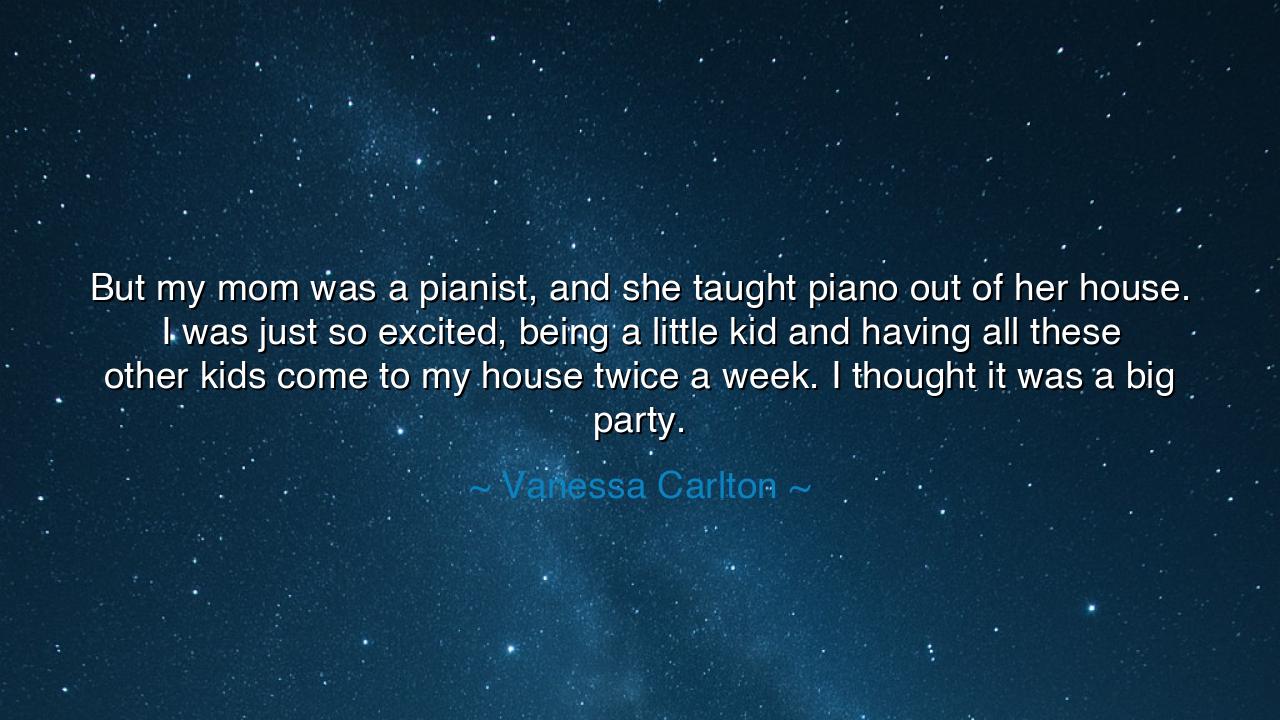
But my mom was a pianist, and she taught piano out of her house.
But my mom was a pianist, and she taught piano out of her house. I was just so excited, being a little kid and having all these other kids come to my house twice a week. I thought it was a big party.






Hearken, children of reflection, to the words of Vanessa Carlton, who recalls: "But my mom was a pianist, and she taught piano out of her house. I was just so excited, being a little kid and having all these other kids come to my house twice a week. I thought it was a big party." In these words lies a meditation upon the seeds of passion, the joy of early exposure, and the formative influence of family in nurturing talent. Since the days of the ancients, philosophers and poets have emphasized that the environment of childhood, especially the presence of devoted mentors and loving guidance, shapes both character and destiny.
The ancients understood that the household is the first theater of learning and delight. Aristotle taught that early experiences mold virtue and inclination, that joy and curiosity in youth are the foundation of wisdom and skill. Carlton’s memory of her mom as a pianist and teacher illustrates this truth: exposure to music, mentorship, and communal activity created a fertile ground for excitement, creativity, and early engagement with the arts. The act of learning becomes entwined with pleasure, turning practice into discovery.
Consider the life of Wolfgang Amadeus Mozart, who, as a child, was exposed to music through his father’s tutelage. His early immersion in piano, violin, and composition, accompanied by audiences of family and peers, instilled both technical mastery and the joy of performance. Carlton’s description of her home filled with other kids mirrors this ancient pattern: communal learning transforms discipline into celebration, making the cultivation of skill both rigorous and joyous.
The quote also illuminates the emotional resonance of mentorship. Carlton’s excitement and perception of the piano sessions as a party reveal the power of positive framing and encouragement. The ancients recognized that learning is not merely the absorption of technique or knowledge, but the cultivation of love, curiosity, and engagement. The environment of early music, imbued with social interaction and the warmth of maternal guidance, becomes a crucible for both talent and emotional growth.
Furthermore, the quote reflects the interplay of discipline and delight. While lessons require focus, repetition, and practice, Carlton’s perception of these sessions as a party shows that joy can coexist with structure. In the lives of many ancient scholars and artists, from Socratic apprenticeships to musical instruction in Hellenistic courts, education was most effective when paired with engagement, excitement, and personal connection. Carlton’s experience exemplifies this principle: skill flourishes in an environment of enthusiasm and shared participation.
From this reflection emerges a timeless lesson: the nurturing of talent is inseparable from encouragement, exposure, and the joy of learning. Carlton teaches that early experiences, guided by loving mentorship and framed with delight, can ignite a lifelong passion. The cultivation of skill is most enduring when it inspires both competence and love for the craft.
Practical actions flow naturally. Engage children in meaningful activities with enthusiasm and support, blending instruction with communal enjoyment. Celebrate early achievements, create opportunities for shared learning, and provide both structure and delight in the development of skills. Recognize that the environment, encouragement, and social engagement shape not only ability but identity and joy.
Remember, children of the ages, that the seeds of greatness are often sown in the fertile soil of love, curiosity, and communal joy. Vanessa Carlton’s words illuminate the eternal truth that guidance from a skilled and loving mom, early exposure to craft, and the excitement of shared participation can transform discipline into delight, creating not only skill but the enduring joy of mastery and the celebration of human potential.






AAdministratorAdministrator
Welcome, honored guests. Please leave a comment, we will respond soon